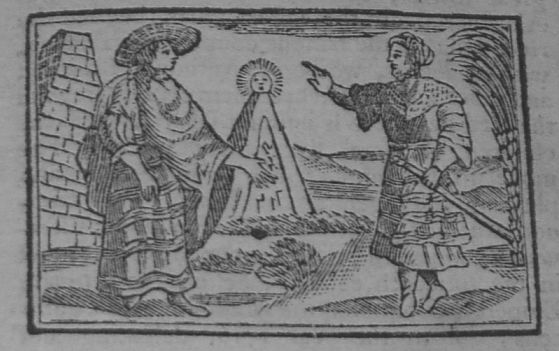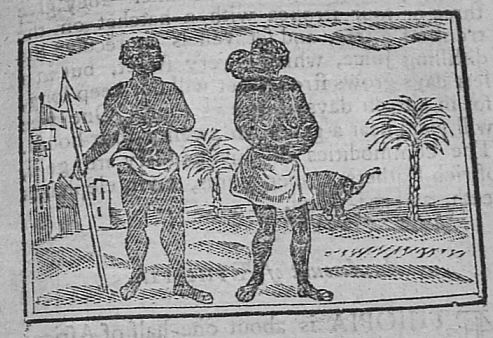 Asia |
AFRICA.
An Egyptian Man and Woman in their proper Habits.

An Account of EGYPT.
EGYPT, a country in Africa, is parted
from Asia by the Red Sea, and bounded on the north by the
Mediterranean; on the east by Arabia Petræa; on the south by
Æthiopia
and Nubia; and on the west by Barbary. The air of this country is
very unhealthy, occasioned by the heat of the climate. The soil
is made fruitful by the river Nile, which overflows the country
annually, from the middle of June to September, and supplies the want
of rain, of which there is very seldom any. It abounds with corn,
and does not want for rice, sugar, dates, sena [senna], cassia, balm,
(124)
leather, flax and linen cloth, which
they export. Diodorus Siculus relates, that there had been
formerly in Egypt, eighteen thousand great towns; the most noted of
which was Alexandria. In the eastern parts, beyond the river
Nile, is the famous country of Thebais, with its desarts [sic], where St. Anthony, St.
Paul, and other anchorets [anchorites;
ascetics], had their cells. Beyond the Red Sea there is
another desart, where the children of Israel lived forty years.
The modern inhabitants are fine swimmers, handy, pleasant, and
ingenious, but lazy. This kingdom was first governed by the
Pharaohs; afterwards conquered by Alexander the Great; and in the
sixteenth century, Selim, the Turkish Emperor, conquered the Mamulucks [Mamluks; originally slave soldiers,
who became a powerful military caste, occasionally seizing power for
themselves, as in Egypt], or Saracens; for in the year 1516,
defeating and killing Camson [Qansuh
I-Ghawri], Soldan [Sultan]
of Egypt, and Tomumbey [Tuman Bey]
the next year after, Egypt was perfectly conquered by the Ottomans or
Turks, who have governed it ever since by their Bashaws [Pashas]. The old religion
of this country was idolatry, but now Mahometanism prevails most,
through there are some few Christians.
An
Account of BARBARY.
BARBARY is bounded by Egypt on the east,
Mount Atlas on the south, the Atlantic Ocean on the west, and the
Mediterranean to the north. Though this country be under the
Torrid Zone, yet the mountains
and sea coasts, between the Straits of Gibraltar and Egypt, are more cold than hot. The men of this country are allowed many wives though they seldom are married to more than one. The women are always veiled in the presence of men; so that a man knows no more of the beauty of the woman he marries, than what he learns from her parents, till they are actually married. The people are of a good mild humour, and such as live abroad under tents, as the Arabians or shepherds, are laborious, valiant, and liberal; but they who live in cities are proud, covetous, and revengeful; and though they traffic much, know but very little, and have neither banks nor bills of exchange. Their commodities are beef, hides, linen, and cotton; raisins, figs, and dates. It is a rich country, and governed, part of it, as Fez and Morocco, by Kings; and the other, as Algiers, Tunis, and Tripoli, by Bashaws from the Grand Seignior [sic]. As for religion, they have the Christian, Jewish, and Mahometan, and they who live in the mountains and fields with their flocke [sic], which are a great number, have hardly any at all. When any one dies, his friends have women that cry and scratch their faces, and take on seemingly with great grief for the deceased. They live mostly on rice, beef, veal, mutton; but wine is forbidden by Mahomet's law.
(125)
and sea coasts, between the Straits of Gibraltar and Egypt, are more cold than hot. The men of this country are allowed many wives though they seldom are married to more than one. The women are always veiled in the presence of men; so that a man knows no more of the beauty of the woman he marries, than what he learns from her parents, till they are actually married. The people are of a good mild humour, and such as live abroad under tents, as the Arabians or shepherds, are laborious, valiant, and liberal; but they who live in cities are proud, covetous, and revengeful; and though they traffic much, know but very little, and have neither banks nor bills of exchange. Their commodities are beef, hides, linen, and cotton; raisins, figs, and dates. It is a rich country, and governed, part of it, as Fez and Morocco, by Kings; and the other, as Algiers, Tunis, and Tripoli, by Bashaws from the Grand Seignior [sic]. As for religion, they have the Christian, Jewish, and Mahometan, and they who live in the mountains and fields with their flocke [sic], which are a great number, have hardly any at all. When any one dies, his friends have women that cry and scratch their faces, and take on seemingly with great grief for the deceased. They live mostly on rice, beef, veal, mutton; but wine is forbidden by Mahomet's law.
(126)
A Description of ZAARA, or the Great Desarts
of AFRICA.
A Description of ZAARA, or the Great Desarts
of AFRICA.
THE air of this country is very hot, so
that the people are forced to keep in their little huts, or seek
refreshment in caverns, the most part of the day; these desarts have a
great number of lions, tigers, and ostriches. The inhabitants are
unpolished, savage, and very bold, for they will stand and meet the
fiercest lion or tiger. They are divided into families or clans,
each head of a family is sovereign in his own canton, and the eldest is
always head; they follow the Mahometan religion, but are no strict
observers of it. The country is a mere desart, as the name
imports, and so parched for want of water, that the caravans from
Morocco to Negroland are obliged to carry both water and provisions,
the province producing hardly any thing for the support of life.
(127)
A Negroe Man and Woman in their proper Habits.

An Account of the Land of the NEGROES.
A Negroe Man and Woman in their proper Habits.

An Account of the Land of the NEGROES.
THIS country lies along the river Niger,
on both sides of it, between Zaara and Guinea. It contains
fourteen kingdoms. --- The inhabitants of the sea coast are
somewhat civilized by their commerce with the Portuguese; but those
that dwell up higher in the country are savage and brutal. They
are continually at war with one another, and all the prisoners they
take in war they sell for slaves. They sow neither wheat nor
barley, but only millet; and their chief food is roots and nuts, pease
and beans. The country is surrounded with woods, and abounds with
(128)
